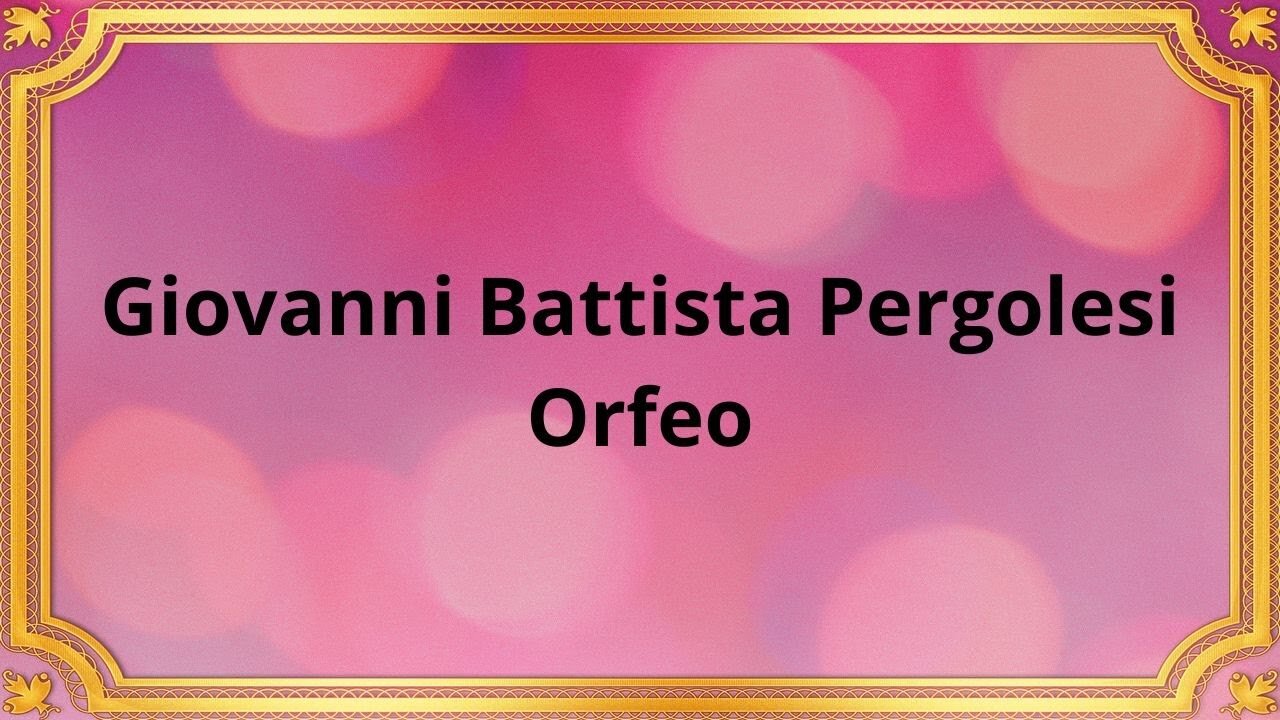Premium Only Content

Giovanni Battista Pergolesi Orfeo
#ClassicalMusic #GiovanniBattistaPergolesi #Orfeo #Opera #Baroque #ItalianMusic #Composition #Melody #Harmony #VocalMusic #Emotions #Tragedy #Myth #Storytelling #MusicalGenius #InfluentialComposer #18thCentury #OperaSeria #OperaBuffa
Publication date 1953
Newell Jenkins Conductor
Giovanni Battista Pergolesi, an influential Italian composer of the Baroque era, left an enduring legacy in the world of music. His opera, "Orfeo," stands as a testament to his exceptional talent and profound understanding of the human voice.
Pergolesi composed "Orfeo" in the mid-18th century, a time when opera was flourishing in Italy. This opera, also known as "L'Orfeo," showcases Pergolesi's mastery of melody, harmonic richness, and emotional depth. Based on the ancient Greek myth of Orpheus, the story follows the tragic journey of Orfeo, a legendary musician, as he descends into the underworld to reclaim his beloved Eurydice.
"Orfeo" is a remarkable example of opera seria, a form of Baroque opera characterized by its serious and noble subject matter. Pergolesi's composition features arias, recitatives, and ensemble pieces that vividly convey the emotional journey of the characters.
The opera opens with a powerful orchestral introduction that sets the stage for the dramatic events to follow. Pergolesi's use of orchestration, particularly the strings and woodwinds, creates a rich tapestry of sound that enhances the storytelling.
Throughout "Orfeo," Pergolesi demonstrates his mastery of vocal composition. The arias, sung by the main characters, are the heart of the opera. Pergolesi's gift for crafting expressive melodies and harmonies allows the singers to convey a wide range of emotions, from profound sorrow to soaring hope. These vocal displays showcase Pergolesi's ability to capture the human experience through music.
Pergolesi's "Orfeo" holds significant historical and musical value. It is considered a pivotal work in the development of opera seria. Pergolesi's innovative approach, blending expressive vocal lines with dramatic orchestration, deeply influenced subsequent composers.
"Orfeo" also played a crucial role in the transition from opera seria to opera buffa, a lighter and more comedic style of opera. Pergolesi's exploration of emotional depth and human vulnerability paved the way for the more nuanced and relatable characters that would emerge in opera buffa.
The enduring appeal of "Orfeo" lies in its ability to touch the hearts of audiences across generations. Pergolesi's gift for storytelling through music, coupled with the universal themes of love, loss, and the power of music, continues to resonate with listeners today.
Conclusion:
Giovanni Battista Pergolesi's "Orfeo" remains a masterpiece of the Baroque era, showcasing his exceptional talent as a composer. The opera's rich musical tapestry, compelling storytelling, and emotional depth have secured its place in the annals of classical music. Pergolesi's ability to capture human emotions through his melodic genius and innovative orchestration continues to captivate audiences, ensuring that "Orfeo" will be cherished for generations to come.
You have the opportunity to support the channel:
https://destream.net/live/RadSiarAl/donate
https://www.buymeacoffee.com/6355radsiaral
-
 32:30
32:30
Classical music_Music Inspiration
24 days agoArturo Toscanini Grand Canyon Suite
691 -
 LIVE
LIVE
TimcastIRL
1 hour agoU.S. Enters Israel Iran War In Defense Of Israel, Deaths CONFIRMED After Iran Strikes | Timcast IRL
23,489 watching -

Barry Cunningham
4 hours agoHERE'S THE NEWS AND SCHEDULE FOR AN AMERICA FIRST WEEKEND!
11.4K11 -
 LIVE
LIVE
megimu32
34 minutes agoOFF THE SUBJECT: FAFO Friday! Bodycam Mayhem & Fortnite Fun
206 watching -
 10:31
10:31
China Uncensored
5 hours agoHow China Is Secretly Behind the Anti-ICE Riots
1.15K7 -
 10:30
10:30
Tactical Advisor
6 hours agoNEW Radian Ramjet/Afterburner | Glock 43x & 48 (FIRST LOOK)
457 -
 LIVE
LIVE
SpartakusLIVE
2 hours ago#1 Specialist EASTER EGG Champion brings YOU Friday Night HYPE
283 watching -
 21:59
21:59
Kitco NEWS
11 hours agoStructural Silver Shortage Could Spark Long-Term Price Surge Warns CEO Phil Baker
151 -
 12:05
12:05
Clownfish TV
7 hours agoThunderbolts* Lost Money, Confirmed.
7141 -
 4:30:09
4:30:09
Nerdrotic
7 hours ago $9.42 earnedThe World is Burning, Let's TACO BOUT Hollywood! | Friday Night Tights 358
95.1K37